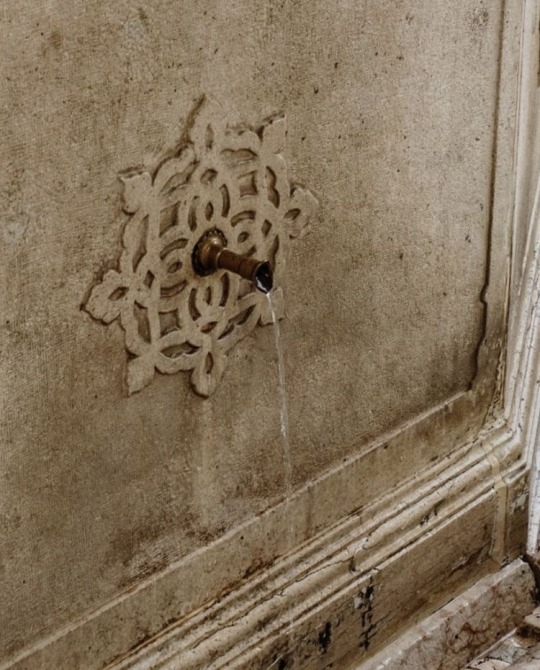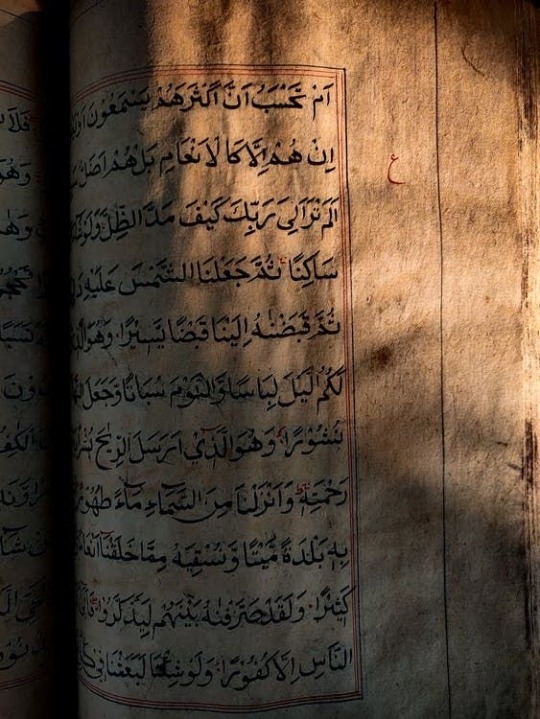A seeker and bibliophile. Nature, Deoband, Tasawwuf etc etc
Don't wanna be here? Send us removal request.
Text
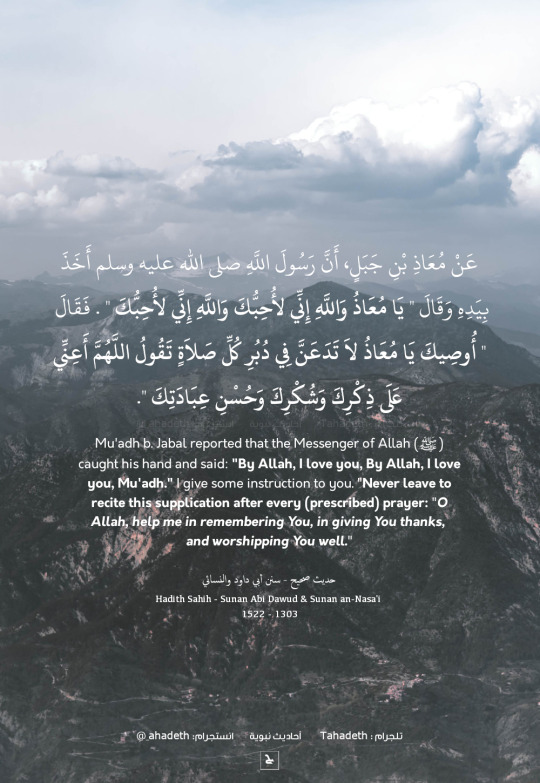
عَنْ مُعَاذِ بْنِ جَبَلٍ، أَنَّ رَسُولَ اللَّهِ صلى الله عليه وسلم أَخَذَ بِيَدِهِ وَقَالَ " يَا مُعَاذُ وَاللَّهِ إِنِّي لأُحِبُّكَ وَاللَّهِ إِنِّي لأُحِبُّكَ " . فَقَالَ " أُوصِيكَ يَا مُعَاذُ لاَ تَدَعَنَّ فِي دُبُرِ كُلِّ صَلاَةٍ تَقُولُ اللَّهُمَّ أَعِنِّي عَلَى ذِكْرِكَ وَشُكْرِكَ وَحُسْنِ عِبَادَتِكَ " . حديث صحيح - سنن أبي داود والنسائي - ١٥٢٢ - ١٣٠٣
Mu'adh b. Jabal reported that the Messenger of Allah (ﷺ) caught his hand and said: "By Allah, I love you. By Allah, I love you, Mu'adh." I give some instruction to you. "Never leave to recite this supplication after every (prescribed) prayer: "O Allah, help me in remembering You, in giving You thanks, and worshipping You well." Sunan Abi Dawud 1522 In-book reference : Book 8, Hadith 107 // Sunan an-Nasa'i 1303 In-book reference : Book 13, Hadith 125
روى أحمد والحاكم عَنْ أَبِي هُرَيْرَةَ رضي الله عنه أَنَّ رَسُولَ اللهِ صلى الله عليه وسلم قَالَ لَهُمْ: ((أَتُحِبُّونَ أَيُّهَا النَّاسُ أَنْ تَجْتَهِدُوا فِي الدُّعَاءِ؟)) قَالُوا: نَعَمْ يَا رَسُولَ اللهِ. قَالَ: ((قُولُوا: اللَّهُمَّ أَعِنّا عَلَى ذِكْرِكَ وَشُكْرِكَ ، وَحُسْنِ عِبَادَتِكَ)).
قوله صلى الله عليه وسلم: (أَتُحِبُّونَ أَيُّهَا النَّاسُ أَنْ تَجْتَهِدُوا فِي الدُّعَاءِ؟) هذا أسلوب تشويق وترغيب تكثر نظائره في أحاديث نبينا الكريم عليه الصلاة والسلام، وهذا نافع في تعليم الخير والدلالة عليه؛ ولهذا قالوا: "نعم يا رسول الله" ، قالوا ذلك عن شوق قام فيه قلوبهم إلى هذه الدعوة الموصوفة بهذا الوصف.
والمعنى: أتحبون أن تدعوا بدعاءٍ يكون فيه اجتهاد عظيم في الدعاء، وقد يُظن أنه سيذكر دعاءً كثيرا وألفاظا مطولة، فذكر هذه الثلاثَ كلمات، وعدَّ صلى الله عليه وسلم هذا اجتهادًا في الدعاء، وهذا يؤكد لنا أن نبينا عليه الصلاة والسلام أوتي جوامع الكلم، وكان يعجبه من الأدعية الجوامع الكوامل ويرشد إليها صلوات الله وسلامه عليه، فحريٌّ بكل مسلم أن يحافظ على هذه الدعوة الموصوفة في هذا الحديث بأنها اجتهادٌ في الدعاء. ...
الحاصل: أن هذه الدعوة دعوة عظيمة ينبغي أن يعتني بها العبد في أيامه ولياليه، وإذا كان من المعتنين بها فليبشر؛ فإنه من المجتهدين في الدعاء، فيواظب عليها دبر كل صلاة وأوقات تحري الإجابة؛ آخرِ الليل، وساعة الجمعة، وبين الأذان والإقامة، وغير ذلك من الأوقات، وتكون من دعواته التي يستكثر منها، لأنها من أعظم ما يكون في باب الاجتهاد في الدعاء.
وهي وصية المحب لمن أحبه ، فقد أوصى بها النبي صلى الله عليه وسلم معاذا رضي الله عنه بأسلوب فيه لطف وتشويق وترغيب، وكان السلف الصالح يتواصون بها؛ فعن أبي عَبْدِ الرَّحْمَنِ الْحُبُلِىُّ عَنِ الصُّنَابِحِىِّ عَنْ مُعَاذِ بْنِ جَبَلٍ أَنَّ رَسُولَ اللَّهِ صلى الله عليه وسلم أَخَذَ بِيَدِهِ وَقَالَ: ((يَا مُعَاذُ وَاللَّهِ إِنِّي لأُحِبُّكَ وَاللَّهِ إِنِّي لأُحِبُّكَ))، فَقَالَ ((أُوصِيكَ يَا مُعَاذُ لاَ تَدَعَنَّ فِي دُبُرِ كُلِّ صَلاَةٍ تَقُولُ اللَّهُمَّ أَعِنِّى عَلَى ذِكْرِكَ وَشُكْرِكَ وَحُسْنِ عِبَادَتِكَ))، وَأَوْصَى بِذَلِكَ مُعَاذٌ الصُّنَابِحِيَّ، وَأَوْصَى بِهِ الصُّنَابِحِيُّ أَبَا عَبْدِ الرَّحْمَنِ.
وقد أفاد هذا الحديث أن لهذه الدعوة مزيدَ خصوصية أدبار الصلوات، وأفاد الحديث الأول أنها أيضًا من الأدعية المطلقة التي يستحب الإتيان بها كل وقت، وكثير من الناس عنايتهم بها مقصورة على أدبار الصلوات. ... كامل الشرح للشيخ البدر في المرفق
من فوائد الحديث
مَشروعيَّة إِخبار الشَّخص بِحُبِّه في الله.
استحباب هذا الدعاء في دُبُرِ كلِّ صلاة مفروضة ونافلة.
في الدعاء بهذه الألفاظ القليلة مطالب الدنيا والآخرة.
من فوائد المحبة في الله التَّواصي بالحق والتناصح والتعاون على البر والتقوى.
قال الطيبي: ذِكْرُ الله مُقدِّمةُ انشراح الصدر، وشُكرُه وسيلةُ النعم المستجابة، وحسن العبادة المطلوب منه التَّجَرُّد عما يَشغله عن الله تعالى. موسوعة الأحاديث النبوية
The Prophet (may Allah's peace and blessings be upon him) took Mu‘ādh (may Allah be pleased with him) by the hand and said to him: By Allah, I do love you, and I advise you, O Mu‘ādh, never fail to say after each prayer: (O Allah, help me remember You) in every word and deed that brings me closer to an act of obedience; (thank You) for bestowing favors and warding off misfortunes; (and excellently worship You) by being fully sincere to Allah and following the Prophet (may Allah's peace and blessings be upon him).
Benefits from the Hadith
It is permissible to inform someone that you love him for the sake of Allah.
It is recommended to recite this supplication after every obligatory and voluntary prayer.
This brief supplication comprises the demands of this worldly life and the Hereafter.
Exhorting one another to the truth, mutual advice, and cooperation in goodness and righteousness are among the benefits of love for the sake of Allah.
At-Taybi said: Remembering Allah is an introduction to relief in the heart, thanking Him is a means of attaining blessings, and the required excellent manner in worship is to be free of whatever distracts one from Allah Almighty. Hadith Translation/ Explanation : English Urdu Spanish Indonesian Bengali French Turkish Russian Bosnian Sinhalese Indian Chinese Persian Vietnamese Tagalog Kurdish Hausa Portuguese Swahili Pashto Assamese Amharic Dutch Gujarati Oromo: https://hadeethenc.com/en/browse/hadith/3518
41 notes
·
View notes
Text
What is Hajj Mabroor?
What is Hajj Mabroor?
View On WordPress
2 notes
·
View notes
Text

عَنْ عَائِشَةَ، قَالَتْ كَانَ رَسُولُ اللَّهِ صلى الله عليه وسلم يُجَاوِرُ فِي الْعَشْرِ الأَوَاخِرِ مِنْ رَمَضَانَ، وَيَقُولُ " تَحَرَّوْا لَيْلَةَ الْقَدْرِ فِي الْعَشْرِ الأَوَاخِرِ مِنْ رَمَضَانَ ". صحيح البخاري ومسلم حديث ٢٠٢٠-١١٦٩
Narrated `Aisha: Allah's Messenger (peace be upon him) used to practice I`tikaf in the last ten nights of Ramadan and used to say, "Look for the Night of Qadr in the last ten nights of the month of Ramadan." Sahih al-Bukhari 2020 In-book reference : Book 32, Hadith 7 // Sahih Muslim 1169 In-book reference : Book 13, Hadith 282
(عن هشام بن عروة عن أبيه عن عائشة) -رضي الله عنها- أنها (قالت: كان رسول الله -صَلَّى اللَّهُ عَلَيْهِ وَسَلَّمَ- يجاور) أي يعتكف (في العشر الأواخر من رمضان ويقول): (تحروا ليلة القدر في العشر الأواخر من رمضان) وقال في الطريق الأولى: "التمسوا" وكل منهما بمعنى الطلب والقصد، لكن معنى التحري أبلغ لكونه يقتضي الطلب بالجد والاجتهاد... ارشاد الساري
ليلةُ القَدْرِ خيرٌ من ألْفِ شَهرٍ؛ فهي ليلةٌ من أشرفِ اللَّيالي، فيها تكونُ الحسناتُ مُضاعَفةً، وتُكفَّرُ فيها السيِّئاتُ، وهي ليلةٌ مُباركةٌ من ليالي رمضانَ؛ وسُمِّيتْ "ليلة القَدرِ"؛ لعَظيمِ قَدْرِها وشرَفِها. وقيلَ: لأنَّ للطاعاتِ فيها قدْرًا. وقيل غيرُ ذلك. ومِن حِكمةِ اللهِ تعالى أنَّه أَخْفاها عنِ الناسِ؛ لكي يجتَهِدوا في الْتِماسِها في الليالي، فيُكثِروا مِن العِبادةِ التي تعودُ عليهمْ بالنَّفعِ. الدرر السنية
Hadith Translation/ Explanation : English French Spanish Turkish Urdu Indonesian Bosnian Russian Bengali Chinese Persian Tagalog Indian Sinhalese Uyghur Kurdish Hausa Portuguese: https://hadeethenc.com/en/browse/hadith/4540
118 notes
·
View notes
Photo
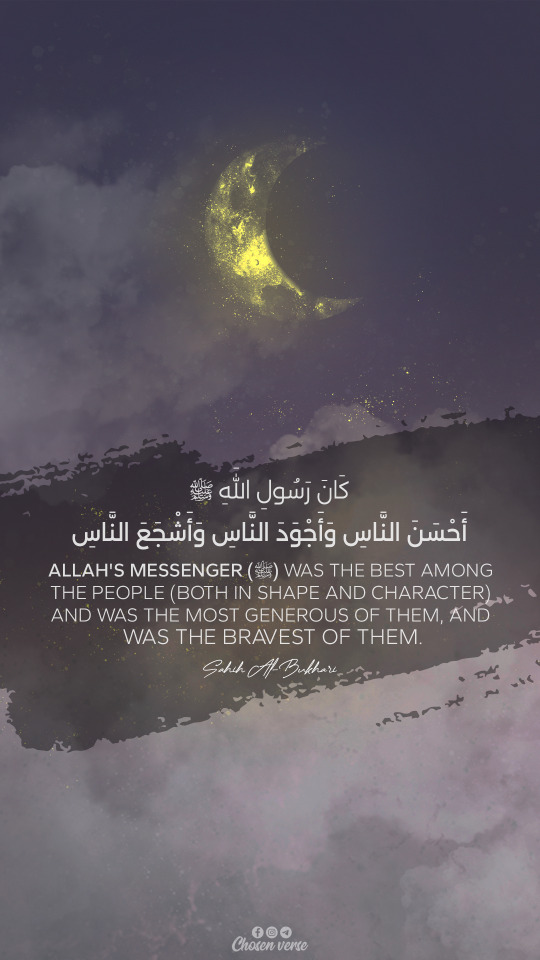

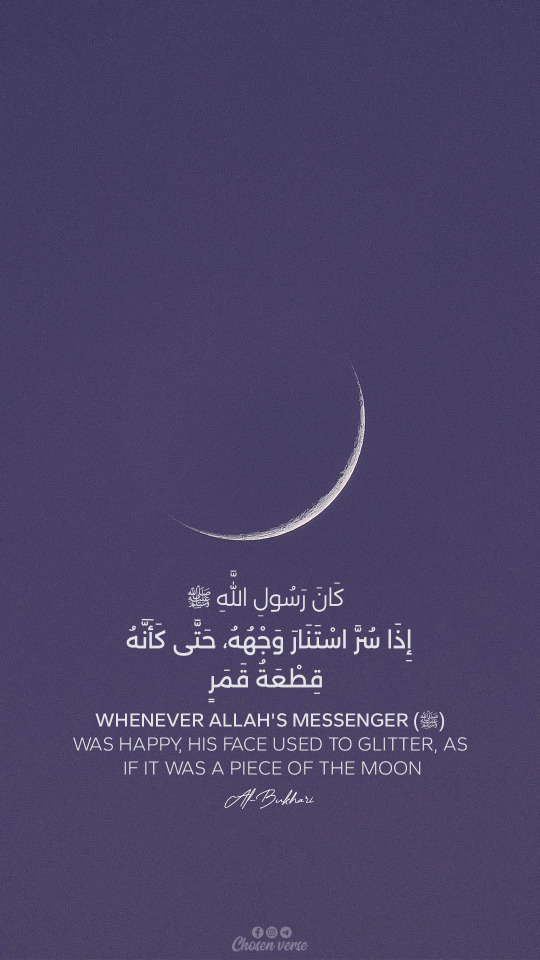
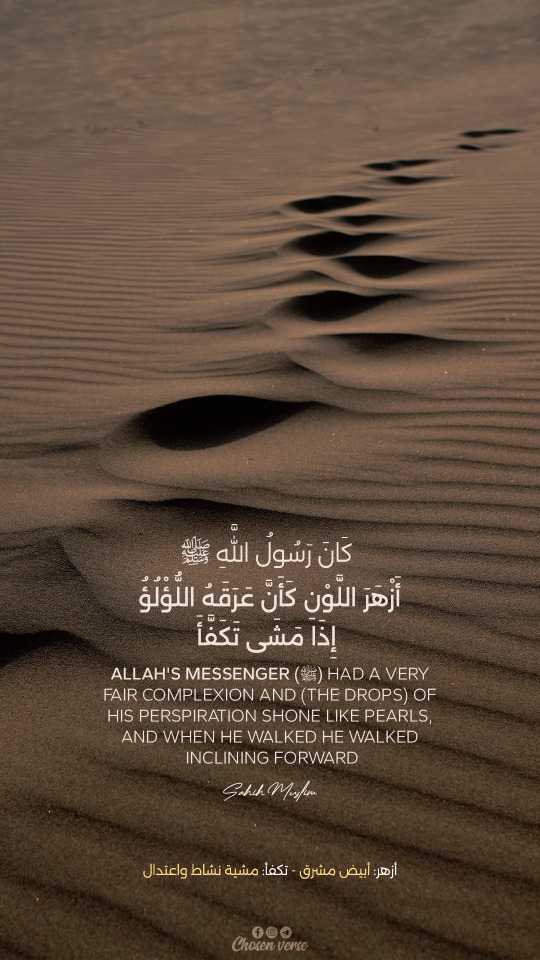


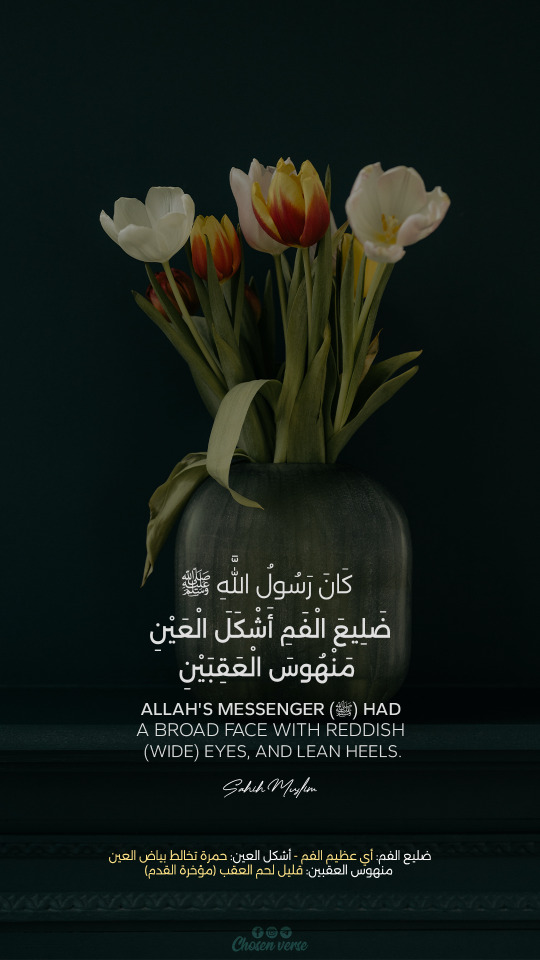

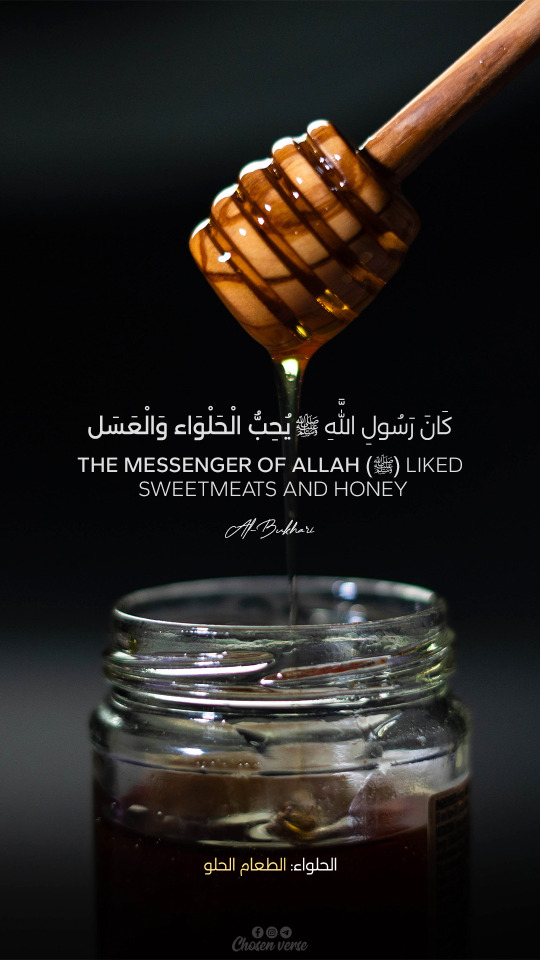

رسول الله (ﷺ) كأنك تراه
Prophet of Allah (PBUH) like if you see him
إِنَّ اللَّهَ وَمَلَائِكَتَهُ يُصَلُّونَ عَلَى النَّبِيِّ ۚ يَا أَيُّهَا الَّذِينَ آمَنُوا صَلُّوا عَلَيْهِ وَسَلِّمُوا تَسْلِيمًا
368 notes
·
View notes
Note
Wow!Jzk for ur reply, not only was it efficient but extremely helpful & informative. Srsly, thanku from the bottom of my heart. As mentioned in ur answer I'd love if u could list some of the books u'd recommend to help increase knowledge. Again jzk!
You’re most welcome, im glad you found it useful. Here are some books I would recommend;
In Qur’an:An Approach To The Qur’anic Sciences by Mufti Taqi Uthmani. This is an amazing book which will help you understand the methodology of the Qur’an and it’s relating sciences; in fact I would call this one of Mufti Taqi’s masterpieces and a must have for Muslims.
Ma’ariful Qur’an by Mufti Muhammad Shafi (Mufti Taqi’s father) which is a comprehensive and extensive commentary on the Qu’ran derived from earlier classical commentaries with contemporary insight. It’s a straightforward commentary which anybody can understand but also has depth and scholarly flair. It’s in 8-volumes so may be pricey to buy but luckily for you it’s available in PDF online which you can find by simply searching the title.
Orientalists and the Qur’an by Dr. Muhammad Mustafa A’zami which exposes the new strategies of orientalists to “reform” and “revise” Islam by questioning the veracity of the Qur’an and he shows how the Qur’an remains fully preserved and protected, as revealed, word by word in a stunningly academic fashion.
Jewels Of The Qur’an by Imam Al-Ghazali which is a book on understanding the aims and objectives of the Qur’an explaining how it’s the source of all Islamic sciences and why certain parts have excellence over others as well as explaining why similitudes, metaphors and allegories are used etc. very valuable for getting a deeper look into the Qur’an.
In Hadith:Studies In Hadith Methodology And Literature by Dr. Muhammad Mustafa A’zami. The book is split into two parts; the first the subject of hadith methodology is disused such as how hadith was recorded and collected etc and the second part discusses the literature introducing the six principle books and six others which have significance in the science of hadith.
Studies In Early Hadith literature again by Dr. Muhammad Mustafa A’zami (because he’s amazing!) and in this book you will find all the absolute essentials in understanding hadith literature, again smashing the orientalists and their criticisms on hadith traditions. This will definitely excel your understanding of hadith along with the previously mentioned book but read the previous one first and then step up to this.
Riyadhus Saaliheen (Gardens Of The Righteous) by Imam An-Nawawi, this is a collection of hadith from authentic sources highlighting important virtues and lessons. I recommend you to get the new edition with the commentary collected by Mufti Afzal Hussain which is very impressive.
The Garden Of The Hadith Scholars by Shah Abd’al-Aziz Al-Dihalwi an anthology of hadith sciences, major books of hadith and hadith scholars.
Faza’il A’maal (Virtues and Good Actions) by Sheikhul Hadith Zakariyyah Khandelwi which is a collection of hadith encouraging towards righteous actions by giving examples from the pious predecessors.
Ma’ariful Hadith by Maulana Muhammad Manzur Nu’mani a collection of hadith on all topics with a clear commentary.
Hayatus Sahabah by Sheikh Yusuf Khandelwi, this is a collection of hadith on the lives and biographies of the sahabah, a must have in every household. There’s so much to learn from within this
In Fiqh (Jurisprudence):The Legal Status Of Following A Madhab by Mufti Taqi Uthmani is a short but powerful book on understanding what a school of law is and why following one is important. The book gives a comprehensive and conclusive understanding on the development of Islamic jurisprudence and extols the need for following qualified scholarship.
The Difference Of The Imams by Sheikhul Hadith Zakariyyah Khandelwi. A detailed and well structured book which details the history and development of the four schools of law and how the differences of opinion came about, giving an understanding of certain principles of hadith and fiqh in simple terms.
The Four Imams by Muhammad Abu Zahra and this book is a compilation of four books which deal with the lives and works of the four imams who founded the four great canonical schools of thought of Islamic fiqh; Imam Abu Hanifah, Imam al-Shafi’i, Imam Malik Ibn Anas & Imam Ahmad Ibn Hanbal.
Taleemul Haq which is compiled by a few scholars is an essential book for every seeker which is a collection of fundamental lessons based upon the five pillars of Islam covering many topics from beliefs to cleanliness, salah, hajj/umrah and many more topics as well as containing important everyday duas. I began studying this book when I was around 8/9 years of age and I still refer to it today, in fact I know Mufti’s who still refer back to it at times; that’s how valuable it is.
In Spirituality:Shariah and Tariqah: Inseperable and Indivisible by Sheikhul Hadith Zakariyyah Khandelwi. In this enlightening book Sheikh Zakariyyah highlights the importance of spirituality in Islam and how it is an essential science that one must endeavour in. He cites various evidences from the shariah to clear confusions and grant an objective understanding of Islamic spirituality.
The Path To Perfection by Hazrat Maseehullah which is a book on the method and purpose of Islamic spirituality, how one embarks upon the spiritual path and identifying blameworthy human characteristics and how to correct them. Must have for any seeker of inner peace and contentment.
Revival Of The Islamic Sciences by Imam Al-Ghazali, considered his masterpiece, his magnum opus and a light in the Islamic sciences. This work will no doubt propel your understanding of Islam and it’s related sciences to higher levels, the depth of wisdom and insight you’ll gain from it can’t be put into words.
The Beginning of Guidance also by Imam Al-Ghazali is a motivational manual detailing the fundamentals for attaining guidance through god-consciousness. He argues that just as there is an end to this noble objective, there is a beginning to it and this is how you find it and stay firm upon it for success.
Ma’arif Al-Mathnawi by Hazrat Hakeem Akhtar is a translation and commentary of Imam Jalal Uddin Rumi’s Mathnawi. I can honestly say it is a gem, packed with deep insight into the poems of Imam Rumi and a commentary that expands your understanding of loving Allah and attaining His love. Hazrat Hakeem Akhtar also adds his own little poems in there that just add an extra amount of warmth.
In History/Biographies:Siratul Mustafa by Imam Idris Khandelwi is a superb and well researched biography on the life of the Prophet ﷺ with key discussions and insights not found in many modern biographies. This not just gives you a picture of the Prophets ﷺ life but adds to your understanding of many other relevant topics.
Stories of The Prophets by Ibn Kathir is a book extracted from a larger work titled al-Bidaya Wa’l Nihayah (The Beginning and The End) and in this book you’ll find the stories of all the major Prophets (alayhimussalaam). A must have in understanding the lives of the past Prophets and taking lessons from their noble lives.
Men and Women Around The Messenger by Sa’d Yusuf Abu Aziz and in this book the author has chosen one hundred personalities from a among the companions and explains their lineage, virtue and relation to the Prophet ﷺ
Hopefully these will keep you busy for now, all the best!
41 notes
·
View notes
Quote
Do good to others so that on the morrow God may not deal harshly with you.
Bustan of Sa’di (via junaydd)
7 notes
·
View notes
Photo

“ من صلى علي صلاة واحدة صلى الله عليه عشر صلوات وحطت عنه عشر خطيئات ورفعت له عشر درجات ” حديث صحيح
11K notes
·
View notes
Quote
Taking of a brief nap following the practice of the Prophet is more salutary than the night-long vigil.
Imam Rabbani Shaykh Ahmad Sirhindi (rahimahullah)
4 notes
·
View notes
Text
Silence…
“O intelligent man what is the tongue in the mouth? It is the key to the treasure-door of a virtuous man. When the door is closed how can one know Whether he is a seller of jewels or a hawker?
Although intelligent men consider silence civil, It is better for you to speak at the proper time. Two things betoken levity of intellect: to remain mute When it is proper to speak and to talk when silence is required.”
Golestaan of Shaykh Saadi (rahimahullah)
18 notes
·
View notes
Text
بلغ العلا بكماله كشف الدجا بجماله حسنت جميع خصاله صلوا عليه وآله
He attained exaltation by his perfection.
He dispelled darkness by his beauty.
Beauteous are all his qualities,
Benediction be on him and on his family.
Source: Gulistan of Sa'di Shirazi
98 notes
·
View notes
Photo
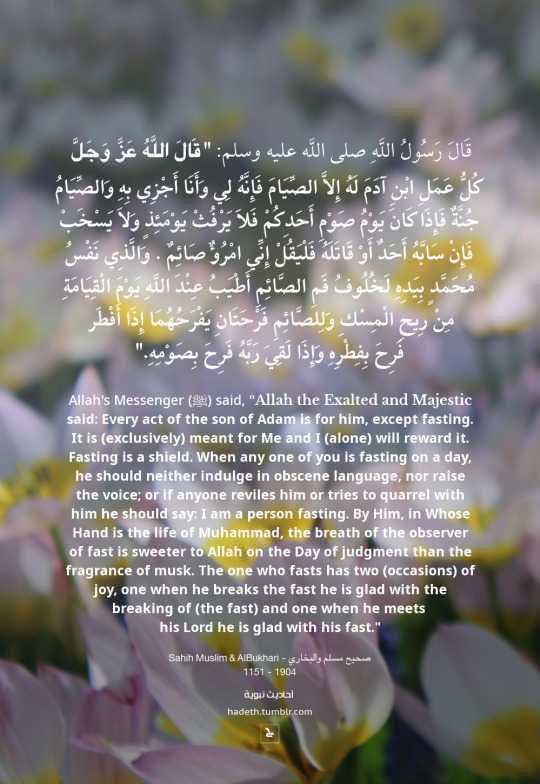
قال رسول الله صلى الله عليه وسلم: “ قَالَ اللَّهُ عَزَّ وَجَلَّ كُلُّ عَمَلِ ابْنِ آدَمَ لَهُ إِلاَّ الصِّيَامَ فَإِنَّهُ لِي وَأَنَا أَجْزِي بِهِ وَالصِّيَامُ جُنَّةٌ فَإِذَا كَانَ يَوْمُ صَوْمِ أَحَدِكُمْ فَلاَ يَرْفُثْ يَوْمَئِذٍ وَلاَ يَسْخَبْ فَإِنْ سَابَّهُ أَحَدٌ أَوْ قَاتَلَهُ فَلْيَقُلْ إِنِّي امْرُؤٌ صَائِمٌ . وَالَّذِي نَفْسُ مُحَمَّدٍ بِيَدِهِ لَخُلُوفُ فَمِ الصَّائِمِ أَطْيَبُ عِنْدَ اللَّهِ يَوْمَ الْقِيَامَةِ مِنْ رِيحِ الْمِسْكِ وَلِلصَّائِمِ فَرْحَتَانِ يَفْرَحُهُمَا إِذَا أَفْطَرَ فَرِحَ بِفِطْرِهِ وَإِذَا لَقِيَ رَبَّهُ فَرِحَ بِصَوْمِهِ “ صحيح مسلم والبخاري حديث ١١٥١،١٩٠٤
Allah’s Messenger (peace be upon him) as said: “Allah the Exalted and Majestic said: Every act of the son of Adam is for him, except fasting. It is (exclusively) meant for Me and I (alone) will reward it. Fasting is a shield. When any one of you is fasting on a day, he should neither indulge in obscene language, nor raise the voice; or if anyone reviles him or tries to quarrel with him he should say: I am a person fasting. By Him, in Whose Hand is the life of Muhammad, the breath of the observer of fast is sweeter to Allah on the Day of judgment than the fragrance of musk. The one who fasts has two (occasions) of joy, one when he breaks the fast he is glad with the breaking of (the fast) and one when he meets his Lord he is glad with his fast.“ Sahih Muslim 1151 d In-book reference : Book 13, Hadith 212 USC-MSA web (English) reference : Book 6, Hadith 2566 Sahih alBukhari 1904 In-book reference: Book 30, Hadith 14 USC-MSA web (English) reference: Vol. 3, Book 31, Hadith 128
435 notes
·
View notes


